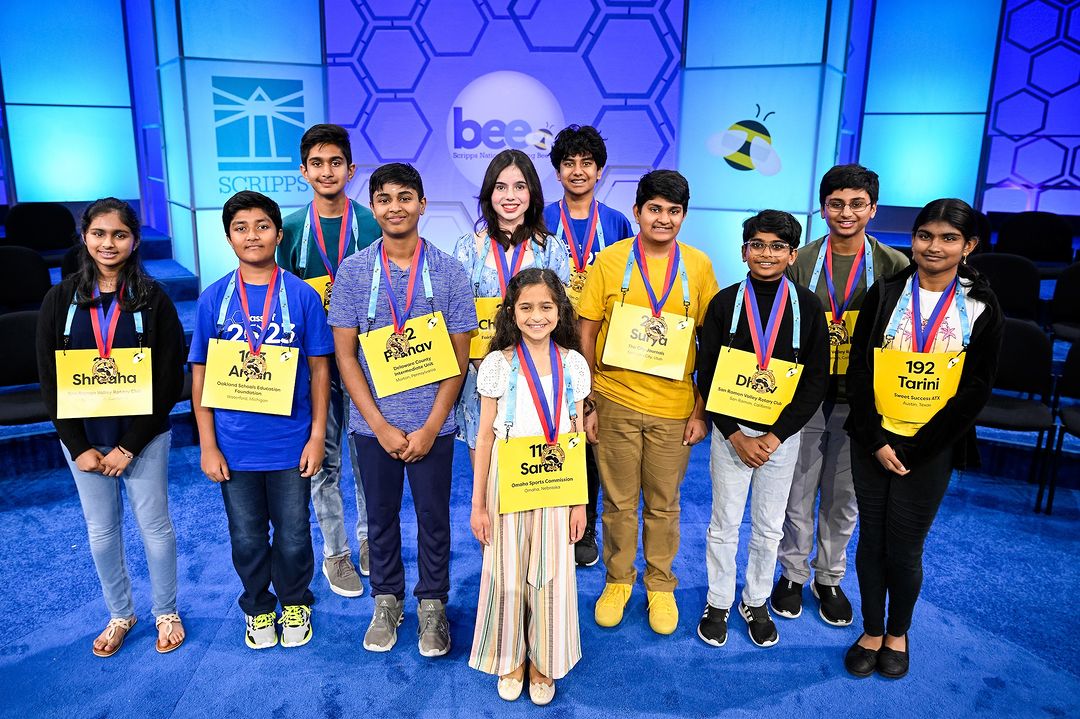Notice: Undefined property: stdClass::$error in /var/www/html/wp-content/themes/theissue/inc/misc.php on line 71
American annual spelling bee, The Scripps National just crowned its 95th champion, an Indian-American eighth-grader from Florida, Dev Shah.
Shah, 14, who won for the word “psammophile”, is the 21st Indian-descent winner of the contest in the last 23 years. He won a $50,000 cash prize, a commemorative medal and the Scripps Cup. As uncommon as they are in India, spelling bees are a major deal and an annual occasion in the USA – something that Indian families especially take very seriously. Dev himself won on his third attempt, after having tried in 2019 and 2021, according to The Print. Shradha Rachamreddy and Surya Kapu shared the third place and each received $12,500.
UnBEElievable! #Speller36 Dev Shah representing the SNSB Region One Bee in Largo, Florida is the Champion of the 95th Scripps National Spelling Bee. His winning word? Psammophile. ? #spellingbee pic.twitter.com/ebM8jUU6xZ
— Scripps National Spelling Bee (@ScrippsBee) June 2, 2023
Every year, about 11 million children in the United States participate in school-level spelling bees. The first Scripps National Bee was held in 1925; because of the pandemic, it was cancelled last year for the first time since World War II. The competition has gotten progressively difficult over the years and has become an integral part of migrant cultures.
The Indian diaspora in the USA clearly shares a special bond with the contest. Despite making up about 1% of the US population, Indian Americans have famously dominated the Spelling Bee scene in the last few decades. At least nine of the 13 finalists of the 2022 edition of the spelling bee were of Indian descent. Before that, in 2019, the contest had eight co-champions, of whom seven were Indian-Americans. There is even a documentary about it “Spelling the Dream” (2020) and it followed four Indian American children preparing for 2017’s bee season, showcasing just how much it means to these families. Since 2008, every single winner at the championship has been Indian.
The craze for spelling bees among immigrant Indian families began in 1985 when Balu Natarajan became the first child of immigrants to win Scripps. Back then, he told New York Times, there were only about 6 participants of Indian descent among the 137 students. “I had no idea how much one could be embraced by a community. People in our community really do pay attention when one of our own is able to have success in something,” NYT quoted Natarajan, now 49. He himself is now the president of the nonprofit North South Foundation, which has over 90 chapters, hosts regional and national educational contests in a variety of subject areas, and raises money through these events for disadvantaged students in India. This is only one such foundation out of many, run by former South Asian spelling champs.
Unlike other immigrant groups in the USA, Indian Americans are comparatively new settlers. Over 60 percent of Indian immigrants living in the United States today arrived after 2000. Many first-generation immigrants survived doing odd jobs and obviously wanted their children to fare better. To make up for the lack of networks and legacy in a foreign land, they focused heavily on making their children excel academically. This has led to a decades-long legacy, even prominent in pop culture.
It’s not just another competition for these families, it’s part of a much bigger culture. It’s an occasion that sees communities come together to celebrate these champions. The contestants take the competition very seriously, preparing well in advance with three to four coaches personally training them. All of them are there to win, but there’s a sense of unity among the community. As long as the winner is an Indian kid, it’s an occasion to celebrate.




